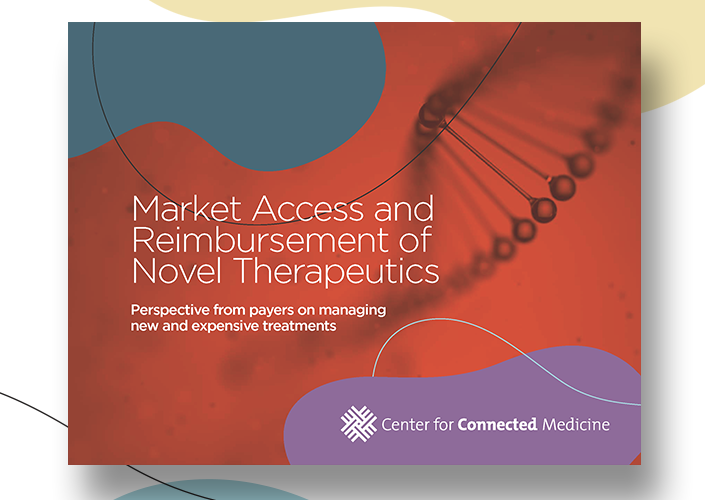Download “Market Access and Reimbursement of Novel Therapeutics” research report for insights on reimbursement decisions at health insurers
Biotech and pharmaceutical companies bringing novel therapeutics to market should be prepared to assuage concerns among payers that these often high-cost drugs are worth their hefty price tags, according to a new survey of health insurance executives by the Center for Connected Medicine (CCM).
The research was conducted in partnership with KLAS Research and surveyed representatives of a wide range of payer organizations, including large national insurers, provider-sponsored health plans, and small regional payers. Download the report from link at the top of the page.
The survey shows payers were nearly unanimous in calling the growing cost of novel therapeutics, such as cell and gene therapies to treat rare and previously untreatable diseases, a “high” concern for their organizations.
Report delivers ‘valuable’ insight for biotech industry
Insurance executives also cited the potential budget impact of these new treatments and whether the drugs were significantly more beneficial than existing standards of care as top challenges when considering whether to reimburse for novel therapeutics, according to “Market Access and Reimbursement of Novel Therapeutics.”
“This research provides valuable insight to the biotech industry as it makes its case for these drugs that in many cases are a first-of-its-kind treatment for patients with few other options. While it can be a challenge for drugmakers to collect robust data when it comes to rare diseases, this research points out that insurers will consider covering expensive treatments if there are data showing positive outcomes,” said James Bauersmith, vice president of translational sciences at UPMC Enterprises, the venture capital, commercialization and innovation arm of leading health system UPMC.
Report shows top criteria for determining reimbursement
The research sheds light on the process for determining reimbursement of novel therapeutics at payer organizations and includes insights into who makes the decisions and what criteria they value most.
Cost-effectiveness and efficacy of the treatments are the primary factors. Not ranking highly among valuable criteria for commercial plans was whether the drug had received approval from the U.S. Food and Drug Administration.
Survey respondents stated that FDA approval doesn’t always guarantee reimbursement, though they are more likely to follow reimbursement decisions from the Centers for Medicare and Medicaid Services.
Insurers who participated in the survey also pointed out the challenge of members who switch health plans that cover high-cost medications. When insurers pay millions of dollars upfront to potentially cure a patient, and then that patient switches health plans, the insurer doesn’t get to recoup the benefit of having a healthy member on its rolls for years to come.
Survey participants highlighted the potential for “milestone” payments to be leveraged over time so that a single insurer isn’t footing the bill when the patient switches health plans.
Life sciences resources from the CCM
New CCM report identifies health systems that are key early investors in biotech startups
Expert Panel Discussion: A New Venture for Health Systems — Biotech Investing
Report: Genomic data management is vital to precision medicine efforts at health systems
Expert Panel Discussion on Population Scale Genomics
Executive Outlook: Genomic Data in Health Systems, with Matthias Kleinz of UPMC Enterprises



